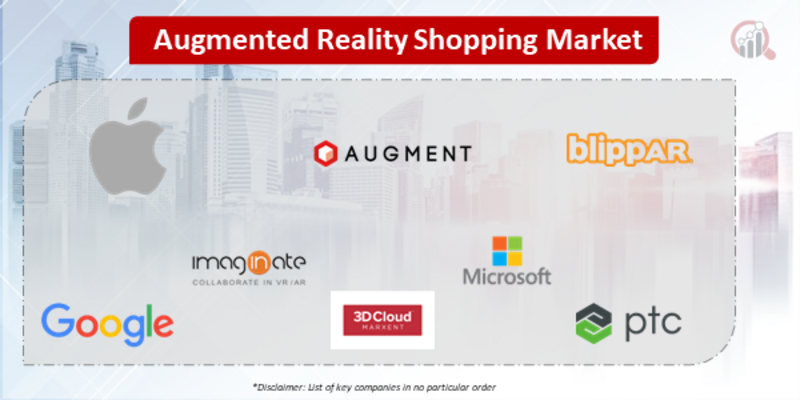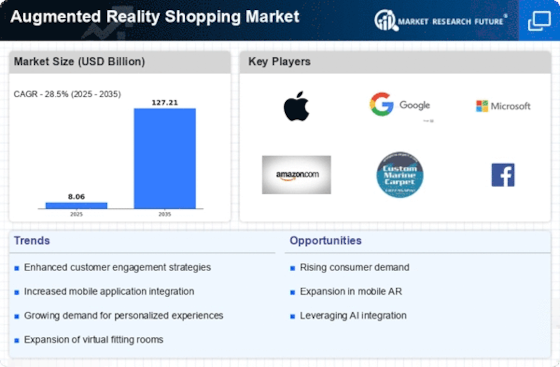Top Industry Leaders in the Augmented Reality Shopping Market

Competitive Landscape of the Augmented Reality Shopping Market:
The augmented reality (AR) shopping market is a burgeoning landscape. This dynamic space demands a keen understanding of the competitive strategies, market share drivers, and emerging players to navigate its potential and pitfalls.
Some of the Facial Recognition companies listed below:
- Apple Inc.
- Augment
- Blippar Ltd
- Google LLC
- Holition Ltd.
- Imaginate Technologies
- Marxent Labs LLC
- Microsoft
- PTC
- ViewAR GmbH
- Wikitude GmbH
- Zugara Inc.
Established Players:
Tech titans like Google, Apple, Microsoft, and Meta (Facebook) occupy the vanguard, leveraging their vast resources and existing ecosystems to develop comprehensive AR shopping solutions. Google's Lens app allows product visualization in homes, while Apple's ARKit empowers developers to create immersive shopping experiences. Microsoft's HoloLens 2, though primarily targeted for enterprise, offers a glimpse into the future of virtual try-on and product interaction. Meta's Spark AR platform democratizes AR creation, enabling brands to build custom filters and experiences for Facebook and Instagram. These established players act as anchors, setting the technological bar and shaping consumer expectations.
Market Share Analysis:
Pinpointing market share in this nascent space is a complex endeavor. While traditional metrics like revenue and user base offer valuable insights, factors like adoption rate across various product categories, brand partnerships, and ecosystem integrations play an equally crucial role. For instance, a furniture retailer employing AR for virtual room-planning might hold significant sway within its niche, even with a smaller user base compared to a broader e-commerce platform offering basic AR product visualization. Additionally, the AR shopping market itself is fragmented, encompassing hardware providers (smartphone manufacturers, headset makers), software developers, platforms, and retailers. Analyzing market share within each segment paints a more nuanced picture.
New Entrants:
Start-ups like Snap, Virtusize, and Wannaby are injecting fresh ideas into the mix, focusing on specific pain points and user segments. Snap's AR filters for trying on clothes and accessories have taken social media by storm, while Virtusize's body scanning technology provides personalized fit recommendations for online shoppers. Wannaby's AR-powered virtual showrooms offer a hyper-realistic shopping experience, blurring the lines between online and offline retail. These nimble players, unburdened by legacy systems, can innovate rapidly and cater to niche markets, potentially disrupting established players.
Competitive Scenario:
The AR shopping landscape is a dynamic dance between collaboration and competition. Partnerships are flourishing, as established players like Apple and Google partner with retailers and brands to develop custom AR experiences. Google's partnership with IKEA, for example, allows customers to virtually place furniture in their homes before buying. Meanwhile, competition heats up in specific areas like virtual try-on, with companies like Virtusize and Zepeto vying for dominance. Open platforms like Apple's ARKit and Google's ARCore are further fueling the fire, enabling developers to create AR experiences across diverse platforms and devices.
Latest Company Updates:
On Oct. 25, 2023- Google launched its augmented reality (AR) shopping feature, allowing people to virtually wear beauty products before purchasing. Google's updated AR beauty tools make it easier to buy cosmetics and hair dye, bringing the feature to mobile browsers and Google Shopping ads, alongside new tools for trying on foundation and hair dye colors. Shoppers can now virtually try on different hair dyes and foundation shades as Google's augmented reality experience expands to ads.
On Oct.12, 2023- Banuba, a leading developer of augmented reality technology, launched a revolutionary Virtual Store Platform for enhanced shopping experience. The platform allows brands to create an online shop that simulates the physical storefront and dressing room but offers more flexibility. Virtual store blends the best of online and physical shopping, and they can be conveniently used wherever the customers are and offers the same interactivity as brick-and-mortar stores.
On July.19, 2023- Amazon introduced several new features for shoppers to find products from their mobile devices using augmented reality shopping technologies. The new AR feature will also allow users to search with images and text to find the exact match for desired products. The retail giant also added several other key functions, including searching via text & images, multimodal search, and the 'Find on Amazon' tool to locate items similar to those in photos shared with the Amazon app.
On Mar. 23, 2023- Snap launched a new business, AR Enterprise Services (ARES), to help retailers with AR shopping, increasing conversions and reducing return rates with augmented reality shopping tools. ARES is a SaaS business that'll help retailers grow their business using AR and AI shopping tools. ARES will equip retailers with tools to allow shoppers to try on clothes, jewelry, and more from various brands from the comfort of their homes.









